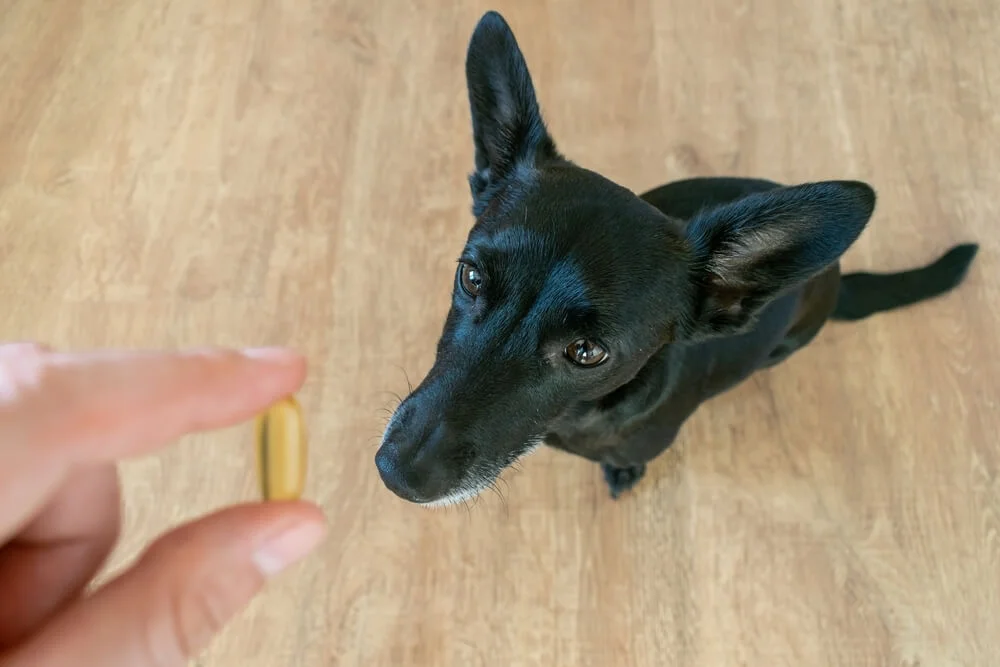
There are all kinds of nutritional supplements available for dogs, all claiming to provide different benefits. It can be hard to know which, if any, are the best ones for your dog. Your veterinarian is the best person to consult about your individual dog’s nutritional requirements but in this article, we’ll take a closer look at flaxseed oil supplements and learn just how beneficial flaxseed oil is to dogs.
What is flaxseed oil?
Flaxseed oil, sometimes referred to as flax oil or linseed oil, is the oil that is obtained from the seeds of the flax plant. The seeds are ground and pressed to release their natural oil. Flaxseed oil is used as a dietary supplement in both dogs and humans due to the high level of omega-3 fatty acid that it contains. Alpha-linolenic acid (ALA) is the main omega-3 fatty acid found in flaxseed oil and can be converted to EPA and DHA which are the active forms of this omega-3.
What are the benefits of flaxseed oil?
As already mentioned, flaxseed oil contains high levels of omega-3 fatty acids. These types of fatty acids have been shown to have anti-inflammatory properties within the body and in humans, and are often used as dietary supplements to aid in conditions such as arthritis, kidney disease, allergies, heart disease, epilepsy, and some types of cancer.
In dogs, flaxseed oil is often used to help support healthy joints and improve mobility, as well as help to maintain a healthy coat and skin. Dog skin problems are fairly commonplace among our pets, and giving flaxseed oil could help to improve the function of the skin barrier and help to manage certain skin conditions. Flaxseed oil also contains dietary fiber which can help promote healthy digestion and prevent constipation.
Some studies suggest that flaxseed oil could help to prevent the growth of cancer cells. These studies are limited and have mostly been performed in test tubes and on laboratory animals, therefore much more research is needed before we can know whether the same is true in dogs.

In dogs, flaxseed oil is often used to help support healthy joints and improve mobility, as well as help to maintain a healthy coat and skin.
Is flaxseed oil better for dogs than fish oil?
Fish oil has long been used as a health supplement for its similar benefits to flaxseed oil. Flaxseed oil is often seen by dog owners as a more appealing alternative to giving fish oil because it doesn’t have much of a smell or give dogs the same fishy-smelling breath that fish oil does! For more info on the benefits of cod liver oil for dogs, check out our other article.
Are there any side effects of flaxseed oil?
Flaxseed oil is safe for dogs but as with anything new that you choose to feed your dog, always check first with your veterinarian to make sure it is suitable for your pet. An allergic reaction could include vomiting, diarrhea, an oily coat, or greasy, flaky skin.
How is flaxseed oil given to dogs?

Flaxseed oil is usually formulated into either capsules or a liquid that is given by mouth. It can be given with or without food.
Flaxseed oil is usually formulated into either capsules or a liquid that is given by mouth. It can be given with or without food but giving it with food can help to prevent gastrointestinal upset. It can also be safely mixed into your dog’s food, and most dogs find it palatable. Some complete & balanced dog foods already contain flaxseed oil as an ingredient so check the label before you give it as a supplement. Flaxseed oil supplements usually take several weeks to take full effect but you might see a gradual improvement over this time.
Are there any dogs who shouldn’t be given flaxseed oil?
You should always consult your veterinarian before introducing anything new into your dog’s diet, including flaxseed oil. Be sure to tell them about any other medications that your dog is receiving, including any other dietary supplements. Some medications and supplements can interact with flaxseed oil.

Conclusion
Flaxseed oil is a common nutritional supplement for dogs and can help to provide anti-inflammatory effects throughout the body. It is most commonly used as a joint supplement for dogs with arthritis. Although it is safe for dogs, you should always consult your veterinarian before introducing flaxseed oil into your dog’s diet.
FAQs
How much flaxseed oil should I give my dog?
Doses of flaxseed oil for dogs range from about half a teaspoon for a small dog up to one tablespoon for a large dog. You should consult your veterinarian for the appropriate amount to give your dog. Commercially available flaxseed supplements should be given according to the instructions on the packet.
What does flaxseed oil do for dogs?
In some dogs, flaxseed oil can help to prevent constipation, as well as improve the symptoms of conditions such as arthritis or skin disease. It is known for its anti-inflammatory properties.
Can dogs have human flaxseed oil?
Human flaxseed oil is generally considered safe for dogs. Always check the amount to give with your veterinarian. Avoid giving supplements that are specially formulated for humans. There are several dog-specific flaxseed supplements available commercially.
Does flaxseed oil help dogs’ itchy skin?
The omega-3 fatty acid in flaxseed oil can help to improve the function of the skin barrier and reduce itchiness, particularly if the itchiness is caused by dry or irritated skin.



